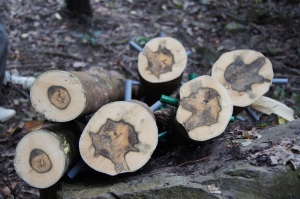TRP Agarwood Project History
The project wood microbiologist, Robert Blanchette, University of Minnesota, in close cooperation with Henry Heuveling Van Beek and TRP staff and associates developed Agarwood projects in Vietnam after examining the profound impact Agarwood harvesting had on the natural forest and the indigenous society of Siberut, a remote island off the coast of west Sumatra, Indonesia. In seven year’s time, the Aquilaria [malaccensis] species became almost extinct due to reckless over-harvesting. Only seedlings and very few young trees survived the “Agarwood fever” to this day. The University of Minnesota was involved in this cooperative work right from the beginning and they also supported the project by providing hundreds of thousand of dollars over the past 9 years.
After continuing research on Agarwood, primarily in Indonesia and through literature studies, a proposal was developed to implement an in-depth study of Agarwood in Indonesia, with a focus on Siberut Island. Unfortunately, Indonesian authorities did not approve of this study at the time [1992]. In 1993, Dr Le Cong Kiet, Professor of Botany and Ecology, and Henry Heuveling van Beek, the founder of The Rainforest Project Foundation, began correspondence and exchange of information. This resulted in an agreement to work jointly on Agarwood in Viet Nam. Two years later the project became reality after funding was granted and scientific support secured.
Previous Work
TRP has been working on agarwood in Vietnam for over seven years, with support from major universities and research institutions worldwide. Lessons learned in Viet Nam and other countries have shown a consistent pattern of over-exploitation and destructive harvesting in natural forests, and the unavailability of alternatives. This problem was identified through a number of scientific studies conducted throughout Southeast Asia, and specific studies and surveys conducted in Viet Nam. A TRP-Agarwood pilot-project implemented from 1995 to 1999, preceded and justified the present second TRP -Agarwood project, which started in 2001. It will be implemented for at least five years. The project is for a large part sponsored by the European Commission. The pilot project covered basic biological, chemical, and marketing research as well as intensive field trials. The TRP Viet Nam project has for the first time ever, scientifically confirmed that Aquilaria trees initiate resin production after being wounded. (Publications and presentations will be made in conjunction with the 2003 Agarwood conference). Over two hundred experiments were conducted on four-to-five year old Aquilaria crassna trees over a period of six years and new experiments are ongoing. A number of experiments Forest pathologist, Bhutan Scientist and Forestry service guards with natural Aquilaria trees in Royal [protected] forests, Kingdom of Bhutan were also conducted in Laos PDR and the Kingdom of Bhutan (2001).
Most importantly, experiments showed that TRP was able to induce Agarwood in planted trees, up to ten-times faster then in nature and in much higher quantities. The project scientists (of the University of Minnesota) developed wounding and inoculation techniques using a variety of compounds and fungi to stimulate resin production.
Project Organization
The project is managed by TRP, through its offices in Amsterdam, Ho Chi Minh City, and project-site offices in An Giang and Kon Tum province. Local management groups are set-up by TRP and provincial authorities. These groups include several farmers belonging to local communities, a member of the principal partner in the province STE, and a TRP representative (in-country national). This TRP representative is working on full-time basis to support each local management group, directly reporting to the project coordinator, who is supported by a Vietnamese person as full-time assistant project manager. TRP commissioned a reputable international auditing firm to review project finances on a yearly basis. TRP, wherever possible, decentralized the project administration to Viet Nam on cost and local income generation grounds.

